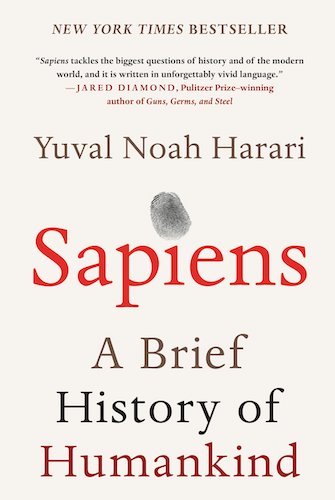Sapiens: A Brief History of Humankind
Book Author: Yuval Noah Harari
Summary reviewed by:
Terrence Timmons
Terrence Timmons
Analyst
Bachelor of Arts (BA), University Of California, Santa Barbara 2019
With over 4 years of experience as an analyst. Terrence Timmons is committed to analyzing summaries without compromising on quality.
Sapiens: A Brief History of Humankind: Summary
What if everything you knew about the evolution of humanity was just the tip of the iceberg? In Sapiens: A Brief History of Humankind, Yuval Noah Harari masterfully condenses 2.5 million years of human history into a compelling narrative that challenges the reader's understanding of our species' journey. Harari's main thesis is straightforward yet profound: Homo sapiens, once an insignificant animal, has become the dominant force on Earth through a series of extraordinary cognitive, agricultural, and scientific revolutions.
The book begins by tracing the Cognitive Revolution, approximately 70,000 years ago, when Homo sapiens developed the ability to think abstractly, communicate complex ideas, and create myths that allowed for unprecedented cooperation among large groups. This revolution set the stage for the Agricultural Revolution, around 12,000 years ago, when humans transitioned from foraging to farming, fundamentally altering the structure of societies and ecosystems.
Harari then navigates through the emergence of empires, religions, and the unification of humankind under global networks of trade and communication. The narrative culminates in the Scientific Revolution, beginning around 500 years ago, where the pursuit of knowledge and the embrace of empiricism led to rapid technological advancement and the eventual dominance of Homo sapiens over the planet.
Throughout the book, Harari weaves together insights from biology, anthropology, history, and economics to present a provocative argument: our species' rise to power has not been entirely beneficial. He questions whether the comforts and conveniences of modern life truly equate to happiness and suggests that our relentless pursuit of progress might be leading us toward an uncertain and potentially self-destructive future.
For those seeking a deeper understanding of how we arrived at the modern world and where we might be headed, Sapiens offers a thought-provoking, accessible, and thoroughly engaging exploration of humanity's past and its implications for the future.
Sapiens: A Brief History of Humankind: Genres
Non-fiction
History
Science
Philosophy
Anthropology
Sociology
Sapiens: A Brief History of Humankind: Themes
Cognitive Revolution: This theme explores the moment in history when Homo sapiens developed unique cognitive abilities, such as abstract thinking and complex communication. Harari argues that these capabilities allowed humans to cooperate in large numbers, leading to the formation of complex societies and the ability to dominate other species.
Agricultural Revolution: The transition from a foraging lifestyle to agriculture radically transformed human societies. Harari delves into how this shift led to the creation of social hierarchies, property ownership, and the rise of cities, but also increased human suffering by tethering people to labor-intensive farming.
The Unification of Humankind: Harari discusses how empires, religions, and trade networks have contributed to the unification of the human species under shared ideologies and economic systems. He emphasizes how global connectivity has both united and divided humanity.
Scientific Revolution: This theme focuses on how the pursuit of knowledge and technological advancement over the past 500 years has transformed the world. Harari questions the cost of this progress, suggesting that while it has led to unprecedented power and comfort, it may also be steering humanity toward ecological disaster and moral quandaries.
Human Happiness: Harari repeatedly questions whether the advancements and progress achieved by Homo sapiens have truly led to increased happiness. He contrasts the perceived benefits of modern civilization with the simplicity and fulfillment of pre-agricultural societies, provoking readers to reflect on the true cost of progress.
Sapiens: A Brief History of Humankind: What You Need to Know
(Contains Spoilers: Perfect for readers seeking a quick review.)
Sapiens: A Brief History of Humankind offers a sweeping narrative of human history, beginning with the emergence of Homo sapiens in East Africa around 2.5 million years ago. The first major turning point is the Cognitive Revolution, approximately 70,000 years ago, when Homo sapiens began to develop language, culture, and the ability to imagine things that do not exist. This newfound capacity allowed humans to cooperate in large numbers, ultimately leading to the dominance of our species over all others.
The book then explores the Agricultural Revolution, which began around 12,000 years ago. Harari explains how the shift from a hunter-gatherer lifestyle to settled farming communities dramatically altered human life. While it allowed for the accumulation of food and the rise of cities, it also led to increased social inequality, labor exploitation, and a departure from the relatively free and equal lifestyle of foragers.
Harari goes on to discuss the unification of humankind through empires, religions, and trade. He shows how these institutions created shared belief systems and economic structures that have shaped the modern world. The discussion includes the rise of capitalism and the spread of global trade networks, which have interconnected distant societies and cultures but also led to exploitation and colonization.
The narrative culminates in the Scientific Revolution, starting around 500 years ago, which marked the beginning of humanity's quest to understand and control the natural world. Harari argues that this revolution has been the driving force behind the rapid technological progress and the massive increase in human power over the environment and other species. However, he also warns of the potential dangers of this progress, including environmental degradation and the ethical dilemmas posed by new technologies.
Throughout the book, Harari weaves a critical examination of whether all this progress has actually improved human happiness. He suggests that while modern humans enjoy unprecedented comforts and capabilities, they may not be any happier than their ancestors. The book ends with a reflection on the future of Homo sapiens, pondering whether our species will continue on its current trajectory or undergo another profound transformation.
Sapiens: A Brief History of Humankind: Methodology
Our summaries are designed with you in mind, focusing on what excites and engages you. By distilling major themes like the Cognitive and Agricultural Revolutions, we ensure that our analysis captures the essence of the author's core messages. We maintain the highest standards of quality and integrity, providing you with accurate and reliable content that not only informs but also resonates deeply with your interests and curiosities. Through expert analysis and thoughtful synthesis, we offer insights that stay true to the original work while making complex ideas accessible and relevant to your life.


Sapiens: A Brief History of Humankind
Date Published: 2011
Disclaimer: As an Amazon Associate I earn from qualifying purchases.




